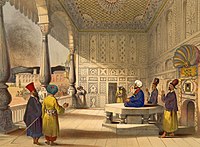
Back عبد الرحمن خان Arabic عبد الرحمن خان ARZ Əbdürrəhman xan Azerbaijani عبدالرحمنخان AZB আবদুর রহমান খান Bengali/Bangla Abdur Rahman Khan Breton Abd al-Rahman Khan Catalan Abdurrahmán Chán Czech Abdur Rahman Khan Danish Abdur Rahman Khan German
| Abdur Rahman Khan | |||||
|---|---|---|---|---|---|
| Amir Ziya'al-Milat wa al-Din | |||||
 Abdur Rahman Khan in 1897 | |||||
| Amir of Afghanistan | |||||
| Reign | 31 May 1880 – 1 October 1901 | ||||
| Predecessor | Ayub Khan | ||||
| Successor | Habibullah Khan | ||||
| Born | 1840–1844 Kabul, Afghanistan | ||||
| Died | 1 October 1901 (aged c. 56–61) Kabul, Afghanistan | ||||
| Burial | 1901 Palace at Zarnegar Park, Kabul, Afghanistan | ||||
| Spouse | Babo Jan | ||||
| |||||
| Dynasty | Barakzai dynasty | ||||
| Father | Mohammad Afzal Khan | ||||
| History of Afghanistan |
|---|
 |
| Timeline |
Abdur Rahman Khan GCSI (Pashto/Dari: عبدالرحمن خان) (between 1840 and 1844 – 1 October 1901) also known by his epithets, The Iron Amir,[1][2] was Amir of Afghanistan from 1880 to his death in 1901.[3] He is known for uniting the country after years of internal fighting and negotiation of the Durand Line Agreement with British India.[4]
Abdur Rahman Khan was the one and only son of Mohammad Afzal Khan, and grandson of Dost Mohammad Khan, founder of the Barakzai dynasty. Abdur Rahman Khan re-established the writ of the Afghan government after the disarray that followed the second Anglo-Afghan war.[5] He became known as The Iron Amir because his government was a military despotism. This despotism rested upon a well-appointed army and was administered through officials subservient to an inflexible will and controlled by a widespread system of espionage.[2]
The nickname, The Iron Amir, is also associated due to his victory over a number of rebellions by various tribes who were led by his relatives.[6] One source says that during his reign there were over 40 rebellions throughout his rule.[7] Abdur Rahman Khan's rule was termed by one British official as a "reign of terror", as he was considered despotic and had up to 100,000 people judicially executed during his 21 years as Emir.[8] Thousands more starved to death, caught deadly diseases and died, were massacred by his army, or were killed during his forceful migrations of tribes.[8] However, he was perhaps the greatest military genius Afghanistan ever produced.[8]
- ^ Tomsen, Peter (2011). The Wars of Afghanistan: Messianic Terrorism, Tribal Conflicts, and the Failures of Great Powers. PublicAffairs. p. 42. ISBN 978-1-5864-8781-2. Retrieved 15 July 2013.
- ^ a b Chisholm 1911, p. 38.
- ^ However, his year of birth is given as 1830 in Chambers Biographical Dictionary, ISBN 0-550-18022-2, page 2
- ^ Cite error: The named reference
thediplomatwas invoked but never defined (see the help page). - ^ Omrani, Bijan (July 2007). "Afghanistan and the Search for Unity". Asian Affairs. 38 (2): 145–157. doi:10.1080/03068370701349086. S2CID 162273503. Retrieved 18 September 2022.
- ^ "ʿAbd al-Raḥmān Khān". Retrieved 15 July 2013.
- ^ Kakar, M. Hasan (2006). A Political and Diplomatic History of Afghanistan, 1863–1901. Brill. p. 10. ISBN 978-90-04-15185-7.
- ^ a b c Lee, Jonathan L. (1 January 1996). The "Ancient Supremacy": Bukhara, Afghanistan and the Battle for Balkh, 1731–1901. BRILL. pp. xxvi. ISBN 978-90-04-10399-3.
© MMXXIII Rich X Search. We shall prevail. All rights reserved. Rich X Search